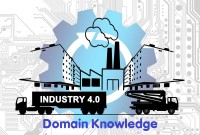- Home
- Business Processes
- Industry Knowledge
- Aerospace Industry
- Automotive Industry
- Banking Domain
- BFSI Industry
- Consumer/ FMCG Industry
- Chemicals Industry
- Engineering & Construction
- Energy Industry
- Education Domain
- Finance Domain
- Hospitality Domain
- Healthcare Industry
- Insurance Domain
- Retail Industry
- Travel and Tourism Domain
- Telecom Industry
- Leadership Skills
- eLearning
- Home
- Leadership
- Change Management
- Understanding Corporate Strategy
Understanding Corporate Strategy
Management outlook and procedures have been revolutionized by more and more innovations over the recent years. It is no longer possible to follow traditional approaches to develop your organization's direction, its management as well its effectiveness. Senior managers need to be good decision-makers. In this section, we introduce concepts for strategy, strategic planning, strategic leadership, their exact meaning and associated terms, and how to use them.
“Perception is strong and sight weak. In strategy, it is important to see distant things as if they were close and to take a distanced view of close things” —Miyamoto Musashi
Leaders need to motivate and influence their employees with their thought leadership, but many lack knowledge of the concepts, tools, and frameworks that are most helpful in thinking strategically. This section will give you a practical but rigorous foundation of frameworks and tools to help you be a more effective participant in strategic decision making.
Meaning of Strategy
You have undoubtedly heard the word strategy and perhaps know a bit about the concept of strategic planning. These have become important parts of management vocabulary and thinking. The word strategy is derived from the Greek word “strategtia” meaning "generalship" which was used first around 400 B.C. The army general organizes and uses his troops for military action. It is this deployment of troops and soldiers that is the basic meaning of the word.
The dictionary meaning of strategy is, “the art of so moving or disposing of the instrument of warfare as to impose upon the enemy, the place time and conditions for fighting by oneself.”
This connotes the art and science of directing military forces. In business parlance, there is no definite meaning assigned to strategy. However, in an organizational context strategy relates to the science or the art of identifying and applying your human and physical resources and carefully preparing for attaining the future goals you have set for your organization.
The strategy is to create a unified, comprehensive, and integrated plan to ensure the achievement of basic objectives through the proper implementation process. The strategy is in fact a plan or course of action or a set of decision rules which are based on policies, objectives, and goals and targeted at moving an organization from its current position to a desired future state. Challenges of the current environment are evaluated to find strategic advantage out of them and strategy also defined the requisite resources that are needed to implement a plan.
Definitions of Strategy
- The pattern of objectives, purpose, goals, and the major policies and plans for achieving these goals stated in such a way so as to define what business the company is in or is to be and the kind of company it is or is to be - Kenneth Andrews (1955)
- “Strategic planning is the continuous process of making present entrepreneurial decisions systematically and with the greatest knowledge of their futurity; organizing systematically the efforts needed to carry out these decisions; and measuring the results of these decisions against the expectations through organized, systematic feedback” – Drucker (1974).
- “Strategy is the common thread among the organizations, activities and product markets, that defines the essential nature of the business that the organization was or planned to be in future”- Igor Ansoff (1965)
- “Strategies are not always the outcome of rational planning. ………….a pattern in a stream of decisions and actions. - Henry Mintzberg (1987)
- “Basically a strategy is a set of decision-making rules for the guidance of organizational behavior.” - Ansoff (1984)
- “Strategy is the unified, comprehensive and integrated plan that relates the strategic advantage of the firm to the challenges of the environment and is designed to ensure that basic objectives of the enterprise are achieved through implementation process” - William Glueck
- “Strategy is the creation of a unique and valued position involving a different set of actives. The company that is strategically positioned performs different activities from rivals or performs similar activities in different ways.” - Michael Porter
- Strategy refers to basic directional decisions, that is, to purposes and missions. The strategy consists of the important actions necessary to realize these directions. Strategy answers the question: What should the organization be doing? Strategy answers the question: What are the ends we seek and how should we achieve them?
Nature of Corporate Strategy
A good strategy is one that helps in the accomplishment of the organization’s objectives. The top management of an organization is concerned with the selection of a course of action from among different alternatives to meet the organizational objectives. The process by which objectives are formulated and achieved is known as strategic management and strategy act as the means to achieve the objective. A few aspects regarding the nature of strategy in the organization context is as follows:
- Corporate strategy is related to what an organization wants to achieve and constraints in the external environment, which is about seeing the big picture and clarifying the strategic objectives. The strategy is the blend of internal and external factors. To meet the opportunities and threats provided by the external factors, internal factors are matched with them.
- Corporate strategy is being formulated at the higher level of management and operational strategies are generally formulated taking a bottoms-up approach identifying relationships, patterns and trends,
- The corporate strategy integrates three distinct and closely related activities in strategy making. The activities are strategic planning, strategic implementation, and strategic evaluation and control. A strategy is the combination of actions aimed to meet a particular condition, to solve certain problems, or to achieve a desirable end. The actions are different for different situations.
- Corporate strategy is related to the long term. Corporate strategy is focused on the determination of long-term goals objectives. It further lays the process for adoption of courses of action and specifies the allocation of resources
- It requires systems and norms for its efficient adoption in any organization. The strategy is future-oriented. Strategy actions are required for new situations that have not arisen before in the past.
- It provides an overall framework for guiding enterprise thinking and action
- It is concerned with a unified direction and efficient allocation of organization resources
- The corporate strategy provides an integrated approach for the organization and aids in meeting the challenges posed by the environment. A well-made strategy guides managerial action and thought.
- Strategies are the most important factor of an organization because they decide the future course of action for the organization as a whole. Successful strategic thinkers constantly reevaluate their environment and plan for the future.
Related Links
You May Also Like
-
Narrative leadership is interpreted as the leader who aspires to construct leadership by telling stories. Leadership is a task of persuasion, of winning people’s minds and hearts. Storytelling is thus inherently suited for the task of leadership. Learn about the narrative leadership style and how to use this style to inspire and motivate followers or to manage change.
-
Discover Your Career Direction
The process of finding career direction begins with specific career exploration and identification of a career that could be passionate about, a career that allows you to make the optimum use of your talents. After identification of the career, you need to acquire skills and tools, and education that can help you get entry into your dream career. Learn the important tips that you cannot afford to miss.
-
Authentic leadership is an approach to leadership that emphasizes building the leader's legitimacy through honest relationships with followers which value their input and are built on an ethical foundation. The authentic leader acts upon his or her values and beliefs, and inspires others to do the same, is committed to know and develop oneself. Are you committed to developing yourself; know your motivations and the purpose of your leadership? Read this article to know more about authentic leadership style and discovering your authentic self.
-
Tools for Developing Your Team
If a manager has too many weak spots in the talent of the team, the ability to empower the team members to independently execute the project is impaired. Assignments fall behind schedule or stretch out because the needed skills or knowledge are not in place when needed. To successfully execute important projects, hiring talented people, and increasing the talents of existing staff are most important.
-
Time management is the process of planning and exercising conscious control of time spent on specific activities, especially to increase effectiveness, efficiency, and productivity. The best time management techniques improve the ways you work. Time management refers to managing time effectively so that the right time is allocated to the right activity. Learn more about the five steps for effective time management viz. study, identify, analyze, decide, and implement.
-
“Level 5 Leadership”, this term was coined by Jim Collins in his book “Good to Great” and it is all about achieving "Greatness" as a leader. This article will explain what we mean by Level 5 Leadership and what the characteristics of a Level 5 leader are. What it takes to achieve greatness as a leader, and what are the steps and strategies that one can use to move up to this top level of leadership.
-
In the early years, most jobs were skill-oriented, and with the development in lifestyles and technology, the current jobs are knowledge-oriented jobs such as management, accountants, design, or computing. Career paths encompass varied forms of career progression and this article discusses how we can build a fulfilling career? Learn here about career paths, industries, and opportunities for gaining experience in the field of your choosing.
-
In our present Hitech scenario, society is changing very fast. What are the skills that are most relevant for leaders in relation to the changing economic environment? Leaders need to develop skills to drive innovation and change in order to play a more central role in their organizations’ activities. How do managers accept the change and meet business expectations by becoming a key figure in driving change and innovation?
-
A good leadership style is something that every effective leader must have in order to succeed, but identifying what that entails or does not entails might be difficult to understand. Most of the research on leadership focuses on the exemplary, best practices, and positive attributes of effective and successful leaders. This article talks about a new approach to learn leadership using lessons from bad leadership. That is the lessons to be learned by examining leaders who have not effectively exercised their power, authority, or influence.
-
Building Your Domain Knowledge
Domain knowledge from a career management perspective encompasses the understanding of industry dynamics and business processes of the target operational area. Domain expert exhibits clear knowledge in the respective industry and understands the industry concepts in general. It is always recommended to best highlight your exposure of domain in your resume or cover letter. TechnoFunc provides you with the best tutorials to gain domain knowledge in a large number of industries and business areas.
Explore Our Free Training Articles or
Sign Up to Start With Our eLearning Courses

About Us
Learning
© 2023 TechnoFunc, All Rights Reserved










